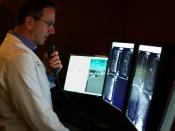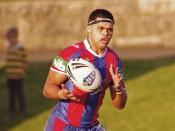Buzzing and Beeping Javier Aleman Section 21336 March 1, 2002 Essay 2 The humming noise coming from room from within the Radiology Department at Del Sol Medical Center almost lulls me to sleep, but the buzzing and beeping from machines in patient's rooms and constant sound of voices keep me awake on this Wednesday, February 20,2002. In fact, all my faculties are fully alert. I examine an elderly man sitting opposite of me wearing a hospital gown who has fallen asleep as he waits to be called into the room from which the humming is emanating. I can smell a funny musky odor, and as I look around looking for the source, a lady calls me back into the waiting area to tell me Adrian Acosta is on his way. I start to think of why I chose radiology as my desired profession. The truth is that the only reason I even began to consider it, is because my father is a radiologist.
I have always looked up to my father and I see how happy he is with his career. He's always telling us about his day at the hospital and what he saw that day. He has told me about all the things he can do with starting out a radiologist should he choose to do so. I find it very appealing that becoming a radiologist could be a stepping stone to attending medical school to become a doctor like his friend did. Now however, I feel I need someone else's outlook on radiology and this interview is the perfect opportunity.
I'm still thinking all about this, when short while later I recognize Adrian Acosta by the blue scrubs all radiologists wear. Adrian is a medium height slender youth. I am surprised by how young he looks. He shakes my hand and introduces himself to me and asks if I would mind stepping outside so that he can smoke a cigarette while I interview him. I agree and along the way we both make small talk about my dad who has arranged this meeting. Once outside, he begins to relax as we sit on a concrete bench and I lay out my things. He looks tired and when I mention it he tells me that he has been working since 10 pm last night. It's a little after 4pm now. He explains that he was asked to cover another employee's shift and accepted. "I'm glad we're having this interview," he says "so that I can take a real break." "I've had two breaks but each time I ended up doing paperwork!" We both laugh and I ask him if it's okay to begin. He lights his cigarette and gives me the go ahead.
"Okay Adrian, what exactly do you do all day?" I ask. "I pretty much spend all day taking x-rays of patients and working with doctors." Adrian adds that it also depends on how busy it is. Sometimes, he says, there are no patients for hours so I get to catch up on paperwork or visit with friends from the department and other departments. He also tells me that there are times when he is so busy he works all eight to nine hours straight without a lunch break. "Do you interact with the patients a lot?" I ask. Adrian thinks for a while and answers, "depends." "Some patients require x-rays only once so with them it's just small talk if they are awake. Other patients I see almost on a regular basis so I get to know them pretty well." I ask him who his favorite kinds of patients are and he says kids. "Kids make you work sometimes because they're scared of the machines and they think it will hurt." I tell Adrian that I like kids and that I would love working with them, and he says that's a good thing because a good number of the patients he sees are kids.
I then ask Adrian where he could work as a radiologist if he were to leave the hospital. He tells me that several clinics in El Paso hire full time radiologists and offer a comparable salary, but don't get to work with as many patients. Adrian also tells me that there are several companies who hire radiologists. "These companies pay much much more, but you are never home. They send you to other parts of the country to temporarily fill positions until a full time radiologist can be hired. They pay your very well, pay for housing, food, and transportation. They're great but you never get to see your family. If you're young, single, and want to see the country then it's the perfect job." As I take a few minutes to write all this down, Adrian takes a long drag of his cigarette and leans back on the wall and closes his eyes. This looks like a good time to ask about the demands of his work. "How much physically does this job demand?" I ask. "Not much as a matter of fact," he says. "Nurses take most patients to the radiology department, and those who can't leave their rooms have a portable x-ray machine taken to thier room." "Shifts are between eight to ten hours long but usually go by pretty fast," he says, "and just by being on call, you can easily pick up extra hours." "You get like $2.50 and hour for being on call, but you hardly ever get called in so you get paid for nothing. If you do get called in then you get paid your regular wage!" "What about mental demands?" I ask. "Not much of that either," Adrian answers. "Once in a while you have to take x-rays of a kid who's been hurt pretty badly and while it may get to you for a little while and you feel bad, you move on." He tells me that the worst thing he ever had to do was take a few x-rays of a dead person and that it kind of freaked him out. This doesn't seem too bad to me considering that I had wanted to be a mortician a while back. I tell Adrian this and he says there is no way he could ever do that. He takes another puff of his cigarette and we move on. "Mentally, you always have to make sure you are being precise. You have to remember that you are working with x-rays and that there is only so much radiation that a person can take safely. You have to be careful not to over radiate the person because that can make them sick. You also have to make sure you cover yourself as well. You must always wear your lead vest and keep an eye on the x-ray levels." I ask him about patient positioning and he tells me you always have to be aware that the patient is hurt and be careful not to further injure them. "Some x-rays require the patient to be placed at a certain angle and failure to do so results in poor picture and you have to redo them. Also some doctors are extremely fickle and complain when a picture isn't too clear." "What kind of training does this job require?" I ask. Adrian tells me he became a radiologist through program offered in a four-year college. EPCC offers a similar program, which is the one I'm hoping to get accepted to. He tells me that you have to pass a state licensing exam and continue your education by taking classes every so often, but that you can do that easily while working. "Most of your continued education you get on the job," he says. "You can also become certified in new procedures which increase your pay," Adrian tells me.
By this time, Adrian takes a final drag on his cigarette. "C'mon man; ask me some more questions so I can stay out here!" We both laugh and I tell him I only have a few more questions. "What's the best part of your job?" I ask. Adrian answers, "The best part is that even though this is my career, It leaves me with plenty of time for a family and other pursuits." "Hopefully I'll be marrying my girlfriend soon and with my salary I'll be more than able to support her." He tells me the typical salary is about $15.50 an hour, but like he said before, the more procedures you become certified in the more you get paid, and these certifications can be done on the job. "You also get signing bonuses for contracts and generous raises each year. "My final question is," I ask, "would you recommend this career to me?" "Definitely," he answers me. "El Paso and most parts of the country have a shortage of radiologists so demand is high. Becoming a radiologist is pretty easy because it doesn't take much time and the pay is great." Just what I wanted to hear.
I thank Adrian for his time and insight and he tells me he want to know what I ended up getting on my paper. We talk for a few minutes longer and then I leave. As I drive home in the heavy mid afternoon traffic I think about what I learned through the interview. More than ever my mind is set on becoming a radiologist. To be honest though, I would like to become more than a radiologist eventually. I would really like to attend medical school. I know of some people who started out in a career in the medical field before going to medical school. They've told me that having worked in the medical field gave them an edge and made medical school easier. My dad's boss had a doctorate degree in Radiology. He told me in an interview a while back that he started out being a radiologist years back and then went on to medical school. Now he's a doctor. That is exactly what I want to do, except I want to become a surgeon. Should I decide not to go to medical school or for some reason I am not able to, being a radiologist I would have a good job to fall back on.
Works Cited Acosta, Adrian. Personal interview. 19 Feb. 2002.


